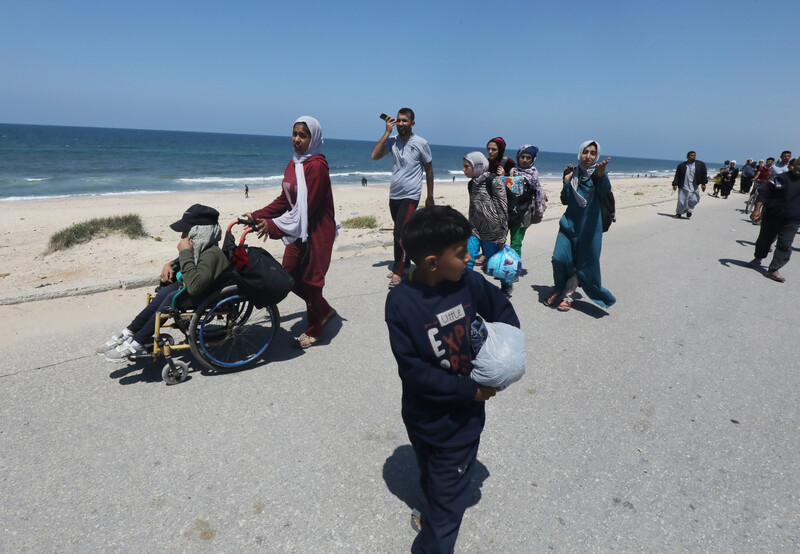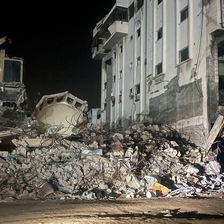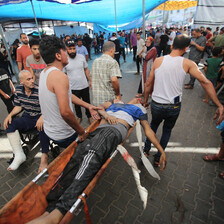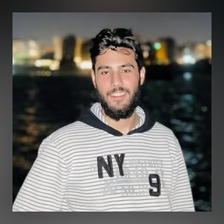The Electronic Intifada 20 September 2024

Hundreds of thousands of people in Gaza have been displaced repeatedly over the past 11 months, here on 14 April.
APA imagesMy immediate family and I decided to evacuate to the south early in this genocide. The Nasser area of Gaza City, especially al-Wihda Tower, where we lived, was a clear target for the Israeli army.
After all, it was before.
So on 13 October last year, we headed south after failing to persuade my grandparents, who wanted to stay in their home.
They did so without major incident until July when my uncle Hazem called one day.
“Your grandfather’s toes started bleeding, but we did not know why.”
He said they had been to doctors without much success.
Over the following weeks, my mother made it her business to try to convince Hazem and the others to travel south.
“We want to come,” he would repeatedly respond. “We don’t know how. We don’t know if the road is open or not.”
We had all heard reports of the Israeli army sometimes turning away people and telling them to leave all their possessions, including water, clothes and other personal stuff.
All the talk on the news was of a possible ceasefire and Hazem preferred to wait.
Heading south
However, the bleeding from my grandfather’s toes was getting worse. On 27 July, my uncle took his family and my grandparents and started their journey.
They took a car from Jabaliya refugee camp and went south until they reached al-Kuwait roundabout.
Then the journey took a turn.
Ismail, my 10-year-old cousin, suddenly panicked.
“‘They saw me, they saw me. Let’s run; they will shoot me’,” Hazem recalled his young son screaming.
At the same time, two soldiers had fired at two men trying to evacuate south. Hearing the sound of gunfire, my uncle and other family members ran as fast as they could and as far as they could reach.
When the sound of shooting stopped, they stopped for a five-minute rest and then resumed walking south.
Under the burning sun, they walked, carrying their stuff and pushing my grandfather in a wheelchair.
An Israeli soldier stopped them and asked my uncle and grandfather to show their ID cards. After they were allowed to proceed, Hazem said he thought they would find people to help them, but “we were surprised that the area there was empty.”
“There were not any living creatures,” he said.
At one point the group stopped walking from exhaustion. At that point, Hazem said, they had walked for about six hours under the scorching sun.
Hazem called my other uncle, Hussam, and I to see if we could pick them up.
We had been told that vehicles could not drive out of the area we were in or they would be targeted. I remember seeing at least three Israeli quadcopters flying ahead of us.
But we had also seen some animal-drawn carts going north.
Costly reunion
It used to be that you could rent a cart for about $10 or $20.
On this boiling July day, we offered a cart driver $100 to pick up Hazem and the others.
He refused at first, citing the risk involved, but was eventually persuaded when we doubled our offer.
He asked for a description to identify our relatives, and I offered to go with him, an offer immediately withdrawn with a resounding “no!” from Hussam.
The cart went and eventually, after much anguished waiting, it returned with the whole family from the north.
I rushed to embrace my grandfather and Hazem
“I am so tired,” my grandfather said. “Bring me something, anything to drink.”
We had brought a couple of bottles filled with cold water. They were quickly consumed.
And as we began the last stretch to Deir al-Balah, our newly-arrived relatives, like travelers from a distant land, voiced surprise at the things they could see being sold by street-side vendors.
“Look there, they have fruits and vegetables,” Hazem’s young daughter, Malak, said. “They also have noodles and chocolates.”
When the group reached our tent, the scene was emotional.
For more than 10 minutes, we all kept hugging, crying and kissing each other.
My mother made a meal for everyone – with chicken!
And even though we had merely reunited in displacement, it felt like a happy ending.
Khaled Al-Qershali is a writer and translator.





